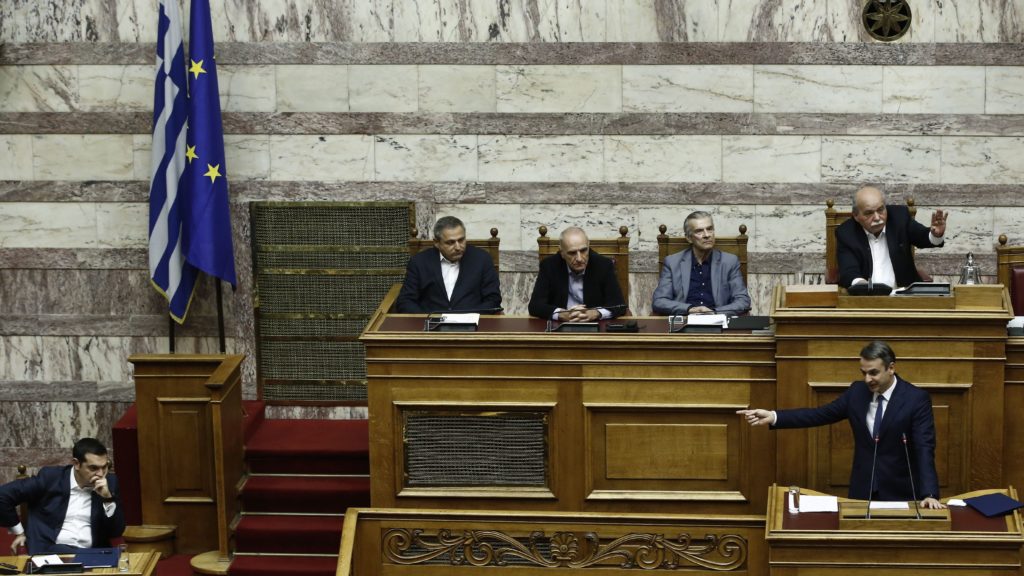Greek Prime Minister Alexis Tsipras managed to win the confidence vote by a razor-thin margin on Wednesday, retaining the parliamentary majority with 151 members expressing their support to his government, after two days of political tension, accusations and heated arguments.
As expected, the debate was marked by an intense clash between the leftist PM and the leader of the Opposition, Kyriakos Mitsotakis, which was widely perceived as setting the tone for the upcoming election campaign.
The leader of the conservative New Democracy party described Tsipras’ cabinet as a “patchwork government” and the former right-wing coalition partner party, ANEL (Independent Greeks) as an “accordion party,” a reference to ANEL leader, Panos Kammenos’ decision to withdraw support from the government, which saw the party’s parliamentary team halved, since several MPs opted to support the government, retaining their seats as independents – along with their roles in the government.
Mitsotakis referred to the confidence vote as “the last act of a political farce” and talked of the “disgrace of parties exchanging MPs,” aligning himself with the critics of MPs who decided to offer support to the SYRIZA government either on the confidence vote, or on the Agreement between Greece and FYROM, which is up for ratification.
In his address to the Parliament, Kammenos explained this decision to withdraw from the government as a matter of principle and called for a referendum on the Prespes Agreement.
The Parliamentary debate was marked by a series of accusations, mainly addressed to the MPs who have expressed the support of the agreement, many saying that they had been receiving threatening calls.
In what was seen as a dramatic gesture, Deputy Minister of Civil Protection, Katerina Papakosta, an independent MP coming from the ND party, offered her resignation to the PM, reacting to “defamatory” accusations of selling out by people who doubt her patriotism. Her resignation was not accepted, but this incident was seen as indicative of a debate that saw MPs being targeted in a series of posters that made their appearance at the streets of Athens and Thessaloniki.
One particular MP seemed to be the target of the most fierce attacks – Spiros Danellis, a member for Iraklio, Crete, with the centrist party ‘To Potami’ (The River) decided to cross the party line and offer his support to Tsipras, motivated by his pro-FYROM-agreement stance. To Potami had pledged to support the government in the vote to ratify the deal, but not in the confidence vote. Danellis was consequently expelled from the party, which is the only opposition party in favour of the Agreement. First elected in 1996 with the Coalition of the Left (the main component party of SYRIZA) and later elected in the European Parliament with PASOK, Danellis has been a vocal advocate of a compromise with FYROM since the name issue first came up, in 1992 and he defended his decision as a matter of principle. In his address, the Iraklio MP urged Stavros Theodorakis, the leader of ‘To Potami’ not to “make the crime, nor the mistake” to withdraw support of the Agreement, because “this Agreement is beneficial for Greece and without this government, there is no agreement.”
It is unclear whether To Potami will continue to support the deal, with many analysts saying that the party was sidelined by Tsipras’ decision to call a vote of confidence on Sunday, following the departure of Kammenos. According to various commentators and politicians, many MPs believed that the government would decide to first call for a vote on the Prespes agreement and then follow with a no-confidence vote, which would allow for To Potami to both keep up with the party rhetoric on the FYROM name issue and keep opposing to the Tsipras government. To Potami MP Giorgos Mavrotas suggested that the government was using the Agreement to extract support for the confidence vote.”Our view of the Prespes deal has not changed. What has changed is the political context in which it comes [to Parliament],” Mavrotas said.
The Prespes agreement was one of the reasons why To Potami left the Movement of Change coalition of centre-left parties, led by PASOK. The centrist party is now leaning towards a collaboration with Nea Dimokratia, having already lost some MPs to the main Opposition party.
But no party has experienced a bigger blow than the former coalition party, ANEL, which is left with five MPs, following the expulsion of Tourism Minister Elena Koundoura and Deputy Minister of Growth, Vassilis Kokkalis, who also supported the government, along with ANEL MPs Thanasis Papachristopoulos and (deputy Speaker) Kostas Zouraris. These four former ANEL MPs, along with Papakosta and Danellis were the six MPs who offered a lifeline to Alexis Tsipras, saving his government. However, as Opposition leader Kyriakos Mitsotakis said, with 145 MPs the SYRIZA government will always be a “de facto minority government and that will reflect to the parliamentary committees.”
For now, though, the main challenge for the government is to ensure the support of 151 MPs for the ratification of the Prespa agreement.







